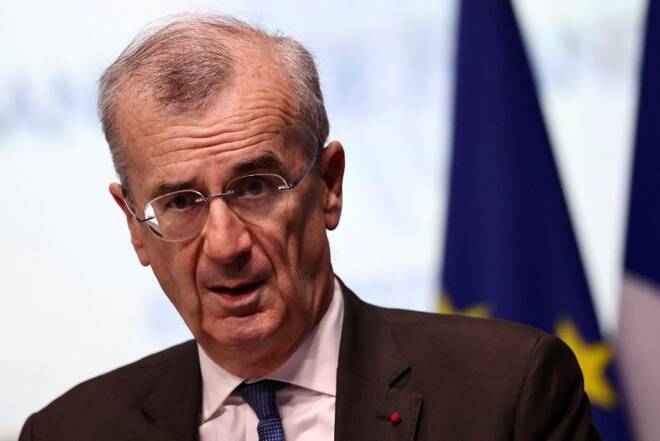Advertisement
Advertisement
New ECB tool must backstop commitment to euro – Villeroy
By:
PARIS (Reuters) - The European Central Bank's planned instrument against financial fragmentation between euro countries must allow it to back up its commitment to defending the euro, ECB policymaker Francois Villeroy de Galhau said on Monday.
PARIS (Reuters) – The European Central Bank’s planned instrument against financial fragmentation between euro countries must allow it to back up its commitment to defending the euro, ECB policymaker Francois Villeroy de Galhau said on Monday.
At an emergency meeting last week, the ECB asked staff to speed up the design of an “anti-fragmentation” tool after a sharp widening in spreads between southern European bond yields versus safe-haven German debt.
Speaking to Italian newspaper Corriere della Sera, Villeroy said the meeting was the best proof that there are no limits on the ECB’s commitment to ensuring stable prices and protecting the euro.
“This should be a backstop instrument. It should be available as much as necessary, so as to make our no-limits commitment to protect the euro very clear,” Villeroy said.
“The more credible such instrument, the less it may have to be used in practice. This is how a backstop works,” he added.
Villeroy, who is also governor of the French central bank, said a tool specifically devised to combat fragmentation was necessary to ensure the orderly transmission of monetary policy across the euro zone’s member countries.
So far ECB President Christine Lagarde has been vague about how the instrument would be used and when it would be ready as well as what conditions could potentially be imposed on countries benefiting from bond purchases under the programme.
Villeroy said that while the programme would have rules the ECB would also have the freedom to exercise its judgement and that market interventions should be sterilised, meaning that they would be done in ways that do not affect its monetary policy stance.
He added that bonds purchased would not necessarily need to be held until maturity but rather until after market tensions subside.
“In other words, we could be more agile in buying but also in selling after some time,” Villeroy said.
(Reporting by Leigh Thomas, Editing by William Maclean)
About the Author
Reuterscontributor
Reuters, the news and media division of Thomson Reuters, is the world’s largest international multimedia news provider reaching more than one billion people every day. Reuters provides trusted business, financial, national, and international news to professionals via Thomson Reuters desktops, the world's media organizations, and directly to consumers at Reuters.com and via Reuters TV. Learn more about Thomson Reuters products:
Latest news and analysis
Advertisement
